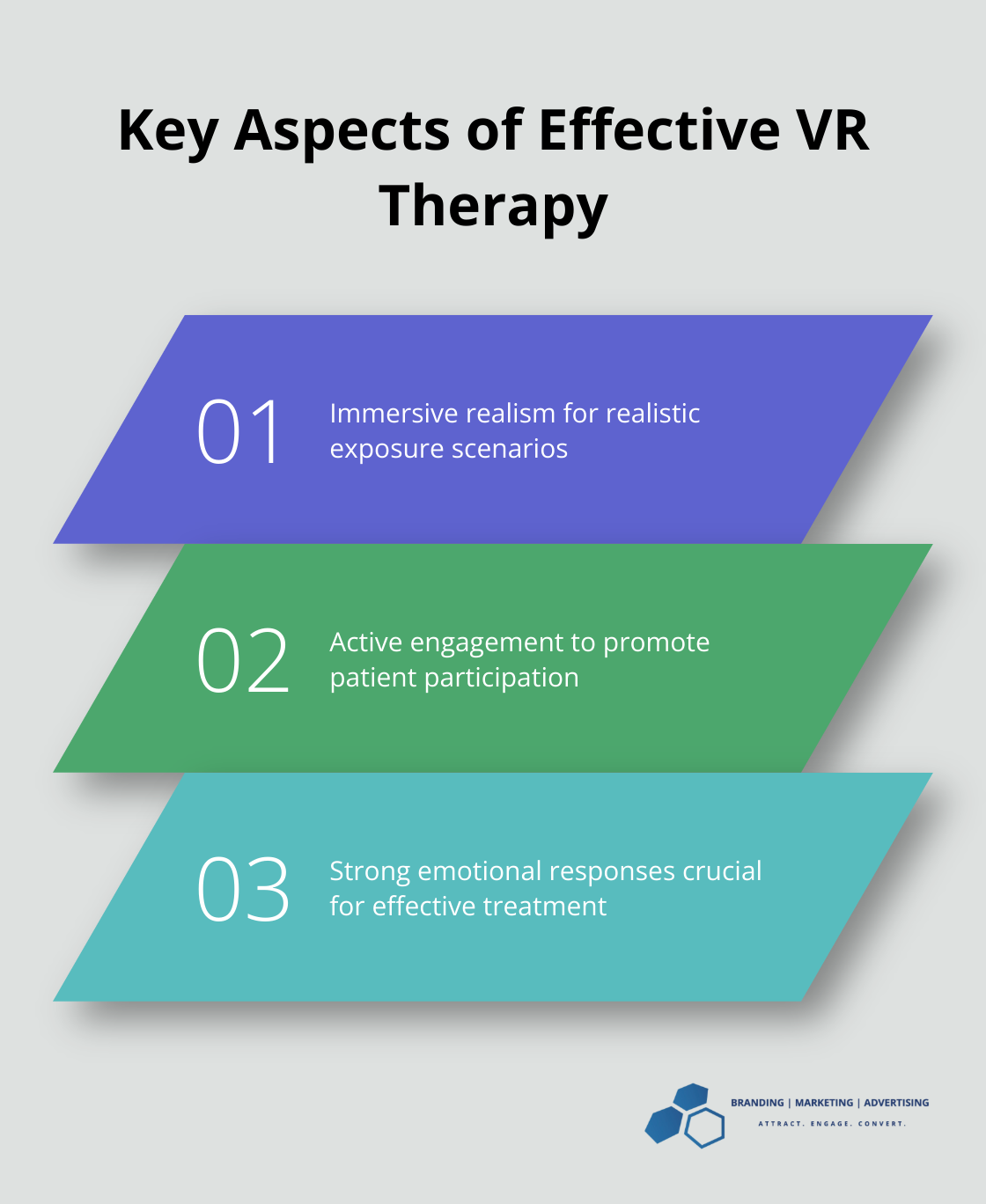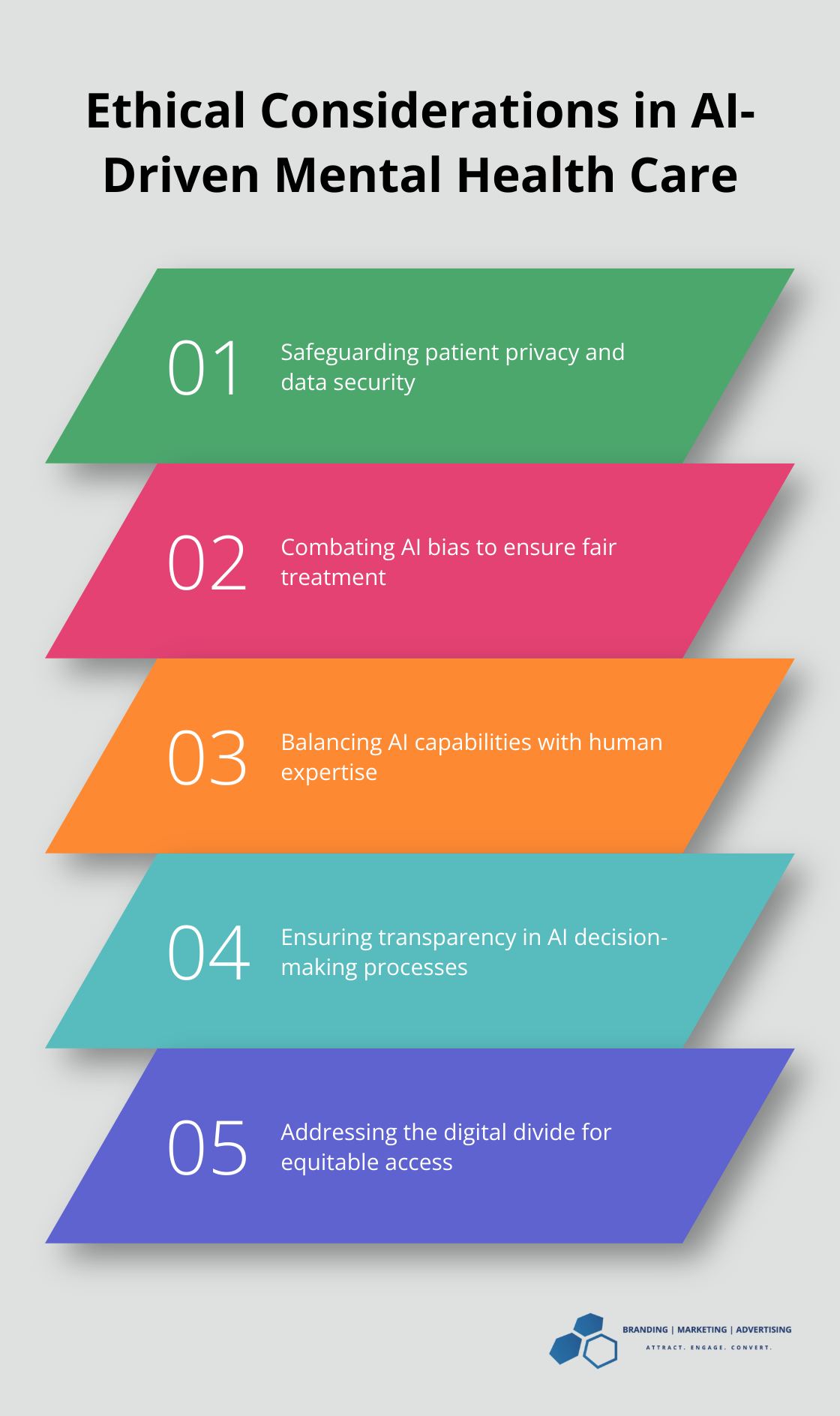How to Use AI in Mental Health Care
At Branding | Marketing | Advertising, we’re excited to explore the transformative potential of artificial intelligence in mental health care.
AI is revolutionizing how we approach mental health assessment, treatment, and support. From automated screening tools to personalized therapy chatbots, these innovations are making mental health care more accessible and effective.
However, as we embrace these advancements, we must also address the ethical considerations and challenges that come with implementing AI in such a sensitive field.
AI Tools for Mental Health Assessment
At Branding | Marketing | Advertising, we witness a revolution in mental health assessment through AI-powered tools. These innovations transform how professionals screen, diagnose, and predict mental health risks.
Automated Screening and Diagnosis
AI-driven screening tools make mental health assessments more accessible and efficient. These tools use natural language processing to analyze responses to questionnaires, identifying potential mental health issues quickly. Recent research shows that AI-based screening detects depression with 89.3% accuracy, rivaling human clinicians.

Woebot, an AI-powered chatbot, stands out as a notable tool. It conducts cognitive-behavioral therapy sessions. A Stanford University study found that Woebot users reported a 22% reduction in anxiety and depression symptoms after just two weeks.
Emotion Recognition Technology
AI advances in emotion recognition. Advanced algorithms analyze facial expressions, voice patterns, and text to detect emotional states. This technology proves particularly useful for individuals who struggle with emotional awareness or expression.
A study published in the Journal of Medical Internet Research revealed that AI-based emotion recognition tools identify emotional distress with 73% accuracy. This capability potentially alerts caregivers or mental health professionals to intervene early.
Predictive Analytics for Risk Assessment
Predictive analytics emerges as perhaps the most promising application of AI in mental health. By analyzing vast amounts of data (including social media activity, sleep patterns, and even typing speed), AI predicts the onset of mental health crises.
Crisis Text Line, a mental health support service, uses AI to prioritize high-risk texts. Their system uses an algorithm to triage service users into categories of high, medium, low-risk, or “no ground truth”, allowing counselors to respond more quickly to urgent cases.
While these AI tools show immense promise, they serve as aids, not replacements for human clinicians. The future of mental health care lies in the synergy between AI capabilities and human empathy and expertise.
As we move forward, it’s important to consider how AI-assisted therapy and treatment can further enhance mental health care. Let’s explore these exciting developments in the next section.
AI-Assisted Therapy Revolutionizes Mental Health Care
At Branding | Marketing | Advertising, we observe a transformation in mental health treatment through AI-assisted therapy. These innovations make mental health support more accessible, personalized, and effective.
24/7 AI Support for Mental Health
AI-powered chatbots change the game in mental health support. SAMHSA leads efforts to advance behavioral health across the U.S., offering resources for mental health, substance use, and community well-being.
Wysa, another AI-powered mental health app, uses natural language processing to understand user inputs and provide appropriate responses based on cognitive-behavioral therapy principles.
Tailoring Treatment with AI
AI revolutionizes how mental health professionals create and adjust treatment plans. AI algorithms analyze vast amounts of patient data to identify patterns and suggest personalized interventions. For instance, the Companion app uses AI to track user behavior and mood, providing therapists with insights to tailor treatment more effectively.
Virtual Reality in Mental Health Treatment
Virtual Reality (VR) therapy, enhanced by AI, proves to be a game-changer in treating phobias and PTSD. Patients found the technology easy to use, with immersive realism, active engagement, and strong emotional responses needed for effective exposure therapy.

The Human-AI Collaboration
While these AI-assisted therapies show immense promise, they serve as tools to enhance, not replace, human therapists. The future of mental health care lies in the synergy between AI capabilities and human empathy and expertise. AI can process vast amounts of data and identify patterns, but human therapists provide the emotional understanding and nuanced interpretation that machines cannot replicate.
As we explore these exciting developments in AI-assisted therapy, we must consider the ethical implications and challenges that come with implementing these technologies in mental health care. The next section will address these critical considerations to ensure responsible and effective use of AI in mental health treatment.
<a href=”https://bestbma.com/blog/how-to-create-a-successful-digital-marketing-strategy”>How to Create a Successful Digital Marketing Strategy</a><a href=”https://bestbma.com/blog/the-importance-of-local-seo-for-small-businesses”>The Importance of Local SEO for Small Businesses</a><a href=”https://bestbma.com/blog/10-tips-for-effective-social-media-marketing”>10 Tips for Effective Social Media Marketing</a><a href=”https://bestbma.com/blog/why-content-marketing-is-essential-for-your-business”>Why Content Marketing is Essential for Your Business</a>
Navigating the Ethical Maze of AI in Mental Health
AI transforms mental health care, but it also introduces unprecedented challenges that demand careful consideration and proactive solutions.
Safeguarding Patient Privacy
Data privacy stands as a top concern in AI-driven mental health care. The sensitive nature of mental health information requires robust protection measures. Experts say it’s time to start integrating AI tools into psychological practice, while prioritizing patient privacy.
To address these concerns, mental health providers must implement end-to-end encryption, secure data storage, and strict access controls. Regular security audits and compliance with regulations like HIPAA are essential. Patients should have full transparency about how their data is used and the option to opt out of AI-assisted services without compromising their care quality.
Combating AI Bias in Mental Health
AI algorithms reflect the biases in their training data. This bias can lead to misdiagnosis and inadequate treatment plans for underrepresented communities.
To mitigate this, developers must use diverse and representative datasets in AI training. Regular bias audits and continuous refinement of algorithms are essential. Mental health professionals should receive training to recognize and counteract potential AI biases in their practice.
Balancing AI and Human Expertise
AI offers powerful capabilities, but it cannot replace the nuanced understanding and empathy of human therapists.
The key lies in leveraging AI to augment human expertise rather than replace it. AI can handle routine tasks, analyze large datasets, and provide initial assessments (freeing up therapists to focus on complex cases and emotional support). Regular training for mental health professionals on effectively integrating AI into their practice is vital.
Ensuring Transparency in AI Decision-Making
Transparency in AI decision-making processes is critical for building trust and ensuring accountability. Mental health professionals and patients alike should understand how AI algorithms arrive at their conclusions or recommendations.
Developers should provide clear explanations of AI models’ functionalities and limitations. This transparency allows for better-informed decisions and helps identify potential errors or biases in the AI’s output.
Addressing the Digital Divide
The integration of AI in mental health care risks exacerbating existing healthcare disparities. Not everyone has equal access to technology or the digital literacy required to use AI-powered mental health tools effectively.
Mental health providers must consider ways to bridge this digital divide (such as offering alternative non-AI options or providing technology education). Ensuring equitable access to AI-enhanced mental health care is crucial for its ethical implementation.

<a href=”https://bestbma.com/blog/how-to-create-a-successful-digital-marketing-strategy”>How to Create a Successful Digital Marketing Strategy</a><a href=”https://bestbma.com/blog/the-importance-of-local-seo-for-small-businesses”>The Importance of Local SEO for Small Businesses</a><a href=”https://bestbma.com/blog/10-tips-for-effective-social-media-marketing”>10 Tips for Effective Social Media Marketing</a><a href=”https://bestbma.com/blog/why-content-marketing-is-essential-for-your-business”>Why Content Marketing is Essential for Your Business</a>
Final Thoughts
Artificial intelligence in mental health care transforms assessment, treatment, and support. AI-powered tools detect depression accurately, while chatbots provide constant emotional support. These innovations make mental health care more accessible and personalized than ever before.
The future of AI in mental health care promises further advancements in predictive analytics and virtual reality therapy. As natural language processing improves, AI-assisted therapy will become more nuanced and personalized. Responsible implementation demands protection of patient privacy, addressing of AI bias, and maintenance of the human element in therapy.
Success requires a balance between AI capabilities and human expertise. AI should enhance, not replace, the empathy of human therapists. Branding | Marketing | Advertising recognizes the potential of AI to improve mental health outcomes while maintaining essential trust and comfort in care.












